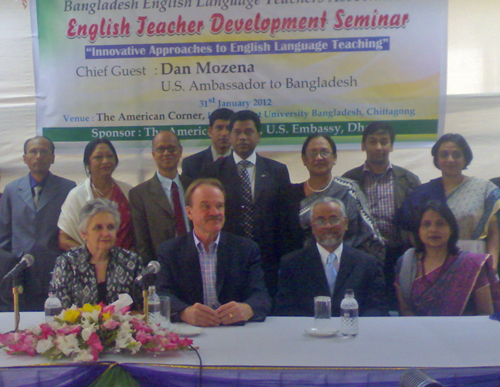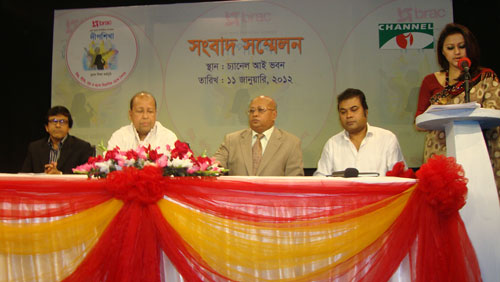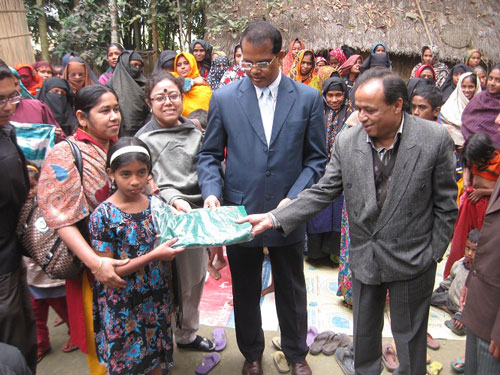
BRAC Education recipient of the TESOL President's Award 2012

9 February, 2012, Dhaka. BRAC Education Programme, Post-Primary Basic and Continuing Education unit (PACE) has been selected as the recipient of the TESOL Presidents’ Award 2012. TESOL (Teachers of English to Speakers of Other Languages) honors the work of BRAC-PACE in promoting English language education and teacher training in Bangladesh.
TESOL International Association (TESOL) is a global education association representing more than 12,000 English language educators worldwide. The TESOL Presidents’ Award is selected annually by TESOL’s Executive Committee in recognition of individuals or entities who have supported efforts for the field in line with TESOL’s values. This year, the Executive Committee selected BRAC-PACE in recognition of its support for Education throughout Bangladesh, and in particular its promotion of English language teaching in primary, secondary and post secondary education.
The Presidential Plenary will be held on Friday, March 30, 2012 in the Grand Ballroom in the Convention Center in Philadelphia, Pennsylvania, USA.
Around 7,000 Head Masters & Assistant Headmasters received Management training, around 30,000 Secondary School Teachers received subject based training and around 15,000 Secondary School Management Committee (SMC) members received training on School Management & Administration from BRAC Education Programme, Post-Primary Basic and Continuing Education unit (PACE). The Objective of this training & workshops are to improve the quality of education of mainstream Secondary Schools in rural areas.
BRAC Innovation Contest Winners Announced
30 January 2012, Dhaka. The results are in! There were a lot of great ideas and feedback from all of our supporters. Congratulations to the ten innovators who have made it to the next round:
- Sydul Sayeed (Organic Farming)
- Justin Uniatowski (Project Maya)
- Jannat Ferdous (Self-Defense techniques)
- Daniel Ng (Playgrounds)
- James Arinaitwe (BRAC Entrepreneurship Academies)
- Tonmoy Islam (BRAC Peace Corps)
- Rob Wheeler ( Global Ecovillage)
- Nadia Afrin (Global Ecovillage Network)
- Ahamed Naveed Hasan (Youth Radio)
- Masud Khan (Amadeyr Cloud)
If your project is listed above, please contact us at This email address is being protected from spambots. You need JavaScript enabled to view it. to learn about the next steps.
You can still see descriptions of all the innovative projects on BRAC's Facebook page.
BRAC puts Entrepreneurs to Work Providing Clean Toilets for Millions
1 February 2012, Dhaka. In Bangladesh, the development organization's Water, Sanitation and Hygiene program gives millions of the rural poor a fresh start with latrines at prices fair to buyers and sellers alike.
Rushada Shahad doesn’t run your typical home improvement showroom. You’ll find no stainless steel fixtures and chrome faucets in her backyard in the Bhaluka subdistrict of rural Bangladesh, where she runs a business selling latrine slabs and pillars. But what this enterprise and others like it lack in luxury, they make up for in impact, providing sanitation to tens of millions of Bangaldesh's rural poor.
BRAC, a global development organization based in Dhaka, Bangladesh, has announced it is financing the start-up of more businesses like Rushada's in a bid to reach households trapped in extreme poverty. With a new round of financial assistance from the Bill and Melinda Gates Foundation, the organization has begun rolling out the second phase of its WASH [Water, Sanitation and Hygiene] program. The first phase has already reached over 25 million people.
Rushada is a “sanitation entrepreneur” trained and financed by BRAC. Micro-franchised start-ups like hers are a “business in a box,” launched by individuals -- but with a business model, marketing support and interest-free loans provided by the organization.
“The WASH program of BRAC has provided 25.5 million people with sanitation, a remarkable increase,” says Babar Kabir, the director of the program. “We look forward to the second phase of the program, where we’ll direct our attention to the ultra-poor, or people living at the bottom 10 percent of the economic pyramid. We are working to eliminate open defecation in Bangladesh.”
BRAC, by most standards is the world's largest non-government organization, is currently scaling up market-based solutions such as these -- most of them developed in its home country of Bangladesh -- in 10 countries in Africa, Asia and the Caribbean.
About 2.6 billion people around the world lack access to basic sanitation, according to the United Nations. Lack of toilets perpetuates a vicious cycle of poverty and malnutrition, with lack of access to clean water and sanitation killing an estimated 1.5 million children under the age of five each year and children missing 443 million total school days annually due to related illnesses.
Late last year, BRAC received a three-year grant of up to $17 million from the Bill and Melinda Gates Foundation to expand its BRAC wash program in rural and semi-urban areas of Bangladesh.
BRAC Inaugurates Radio PolliKontho 99.2 FM in Moulavibazar
BRAC's Radio Pollikontho is being broadcast from Chadnighat union in Maulvibazar within a radius of 17 km from the station. The radio formally went On-Air on 5th January, 2012, and is being broadcast twice a day: 9:00 am - 11:00 am in the morning, and 3:00 pm - 5:00 pm in the evening.
Radio Pollikontho, which is broadcasting programmes with focus on education as well as entertainment, can serve as a sustainable platform towards improving the socio-economic condition of the poor and disadvantaged and ensure people's right to information. Programmes are primarily being broadcast in the local dialect, with focus on women and children's issues and development. The radio is increasing people's access to information on various issues such as agriculture, education, health, environment, disaster management, women and children's rights, entertainment, market price, resources and services from government and nongovernment organizations, among others.
Although Community Radio has become very popular in many parts of the world, it is a relatively new concept in Bangladesh. It is hoped that, with the facilitation of BRAC Community Empowerment Programme and the active participation of the local people, Radio Pollikontho will make significant contribution towards increasing people's access and right to information, and help establish Digital Bangladesh.
Decade of Excellence celebrated by – Advocacy for Social Change
11 January 2012, Dhaka. At the evening from 06.00pm to 09.00pm on January 07, 2012 the amazing and colorful function had get started through tuning the flute with drumbeats as keep hold the heritage of Bengal. Accordingly inaugural session of a few minutes went with different fine tuning activities of Art culture, specified by the starting song “Sob Cota Janala Khule Dao Na .....” and 10 candles lightening with recalling memory / reflections sharing from participants having past or present relation with the works of this section.
Former ED of BRAC and Adviser to the Caretaker Government Abdul Muyeed Chowdhury; Former Adviser to the Caretaker Government and ED of CAMPE Rasheda K. Chowdhury; ED of BRAC, Dr. Mahabub Hossain; Member of Planning Commission, Dr. Samsul Alam; Chairman – PSC, Ex Cabinet Secretary and former Advisor of this section Dr. Saadat Husain; Director, Bureau of Manpower Employment and Training (BMET) Dr. Nurul Islam; Bureau Chief – Associated Press (AP), Farid Hossain; CEO - Boishakhi TV, Manjurul Ahsan Bulbul; Professor SIT Vermont, USA, Jeff Unsicker; renowned folk singer Mr. Fakir Alamgir; Ex. ProVC BRAC University and Ex. member of BRAC Governing Body Dr. Salehuddin Ahmed; Pro VC – BRAC University Professor Md. Golam Samdani Fakir; Director of the Institute of Governance Studies, Barrister Monjur Hussain and many other renowned persons of society and senior most persons of BRAC line management were present in the function.
Director, Gender Justice & Diversity and Advocacy Sheepa Hafiza delivered her welcome speech mentioning Goal & Objectives of this section, achievements and future plan. In her speech, she commemorates and highly emphasized on the Advocacy program launching speeches by Sir Fazle Hasan Abed, Chair Person, BRAC on December 24, 2002. The function was conjugated with inauguration of Policy Advocacy Course facilitated jointly by – Advocacy for Social Change, BRAC; Institute of Governance Studies, BRAC University and School of International Training (SIT), Vermont USA for both of local and foreign candidates.
With well wish and congratulation from other participant’s of the function, ED of BRAC Dr. Mahabub Hossain said “Continuous research works to find out laps and gaps, necessity estimation are in need to ensure better performance by advocacy activities.”
Finally the occasion went to the more colorful cultural show performed by the performers of BRAC Adolescent Development Program (ADP), Mr. Fakir Alamgir and a local group of artists.
Deepshikha, an initiative by BRAC to bring out hidden talents

11 January 2012, Dhaka. at Channel i office, Dr. Mahbub Hossain, Executive Director- BRAC, Safiqul Islam, Director- Education Programme , Faridur Reza Sagar, Managing Director, Impress Telefilm Ltd and Channel-i have attended the press conference event of Deepshikha, a cultural competition programme by BRAC Primary and Pre-primary school students. On press conference officially BRAC and Channel i declared details about ‘Deepshikha’ and the reason behind starting the competition.
At the beginning of February 2011 the competition was started at root level and it continued . Finally 150 participated were selected from divisional level. Well known celebrity like Shubir Nandi, Ferdous Ara, Laila Hasan, Minu Haque, Shomorjit Roy Chowdhury, Konokchapa Chakma, Jhorna Sarkar and Rabi Sankar Moitri were in the judge panel. Quarter final and grand finale will be broadcasted in Channel i.
Besides regular classroom study BRAC school students are involved in extra-curricular activities like singing, dancing, acting, drawing and reciting. BRAC School teachers help them to learn these with fun. Deepshikha is an initiative by BRAC Education Programme to bring out their hidden talents.
BRAC and Ministry of Youth Sign Memoranda

09 January 2011, Dhaka. At BRAC Centre, DG of Youth Development Directorate AKM Manjurul Haque and BRAC Education Programme's Director Safiqul Islam attended the ceremony of signing Memoranda of Understanding between BRAC and the Ministry of Youth and Sports. The MoU will enable BRAC Multipurpose Community Learning Centres' members to receive institutional and non-institutional skill development training provided by Youth Development Directorate.
Every year 10,000 members (50% female) of BRAC Multipurpose Community Learning Centres will receive skill development training from Youth Development Directorate. Among members female candidates will get higher priority. BRAC will look after the logistics part.
BRAC Executive Director, Mahbub Hossain, Director of Communications Asif Saleh and Director of Training Abdur Razzaque were also speakers at the event.
AKM Manjurul Haque said that from this agreement both parties will be benefited as both of them have similar objective and that is to develop skilled society. Dr. Mahbub Hossain mentioned that we need to integrated approach to develop our youth. We can be economically advanced country if we can make them productive. This agreement is a good example of private-public partnership.
99.83% pass rate in Primary Terminal Examination 2011

28 December 2011, Dhaka. On 26 December 2011 Primary Terminal Examination results came out. BRAC Primary School students have excelled in achieving a pass rate of 99.83%, with 70% of them receiving, A , A or A- grade. This is marginally higher compared to country's aggregate pass rate of 97.26%. However, BRAC students complete the 5 years primary cycle in 4 years while formal/mainstream primary schools in 5 years.
From BRAC Primary Schools 1,65,234 students attended the exam, 1,65,006 students passed the exam and 4,313 students got GPA-5. This year, a total of 23,16,521 students from all over the country from 87,832 schools registered for the exams, of whom 21,85,747 showed up in the exam halls.
We have special focus on Ethnic children and Children with special needs who can not fit themselves in mainstream primary schools. >From our schools 4,923 children with special needs appeared in the exam and 4,913 students passed the exam (99.80% pass rate). In BRAC Primary schools Children with Special Needs receive corrective surgeries along with devices like wheelchairs, hearing aids, glasses and ramps.
This year 6,488 BRAC Primary schools participated in Primary Terminal Examination, among them 546 BRAC Primary schools were especially for disadvantage background like ethnic minority group. This year 9,777 ethnic children appeared in the exam and 9,735 students passed the exam (99.57% pass rate). In BRAC schools ethnic children receive class lecture and course materials in their own languages up to grade two so that they can overcome language barriers and cultural gaps.
The examinations began on November 23 and ended on November 30. Students of class-V must qualify at the terminal exams to enrol in class-VI. Replacing the division system, this year's results were in grades in conformity with other public exams.
BRAC distributes around 2 crore worth warm clothes

27 December 2011, Dhaka. BRAC Education Programme has been distributing a warm clothes worth around two crore taka. Warm clothes are distributed in 14 districts amongst 1,08,750 students of underprivileged backgrounds.
In the middle of this month multiple individuals in Bangladesh’s northern regions lost their lives due to lack of adequate warm clothing. The temperature recently significantly dropped, leaving many villagers unprepared for the elements, often leading to tragedy. BRAC Education Programme has taken prompt initiative to distribute warms clothes and it has projected cost 18,158,250 taka to give warmth in poorest and coldest areas. Distribution has been started on 17 December 2011 and it will be ended hopefully by first week of January 2012. It has been circulated with the support of local government officials.
The districts include Panchagor, Thakurgoan, Nilphamari, Kurigram, Lalmonirhat, Netrokona, Serpur, Jamalpur, Mymensing, Chuadanga, Meherpur,Sunamgonj, Moulovibazar and Hobigonj.
BRAC is also hosting a “warm clothes drive” in Dhaka, in which individuals can donate old/used clothes. The donation bin is located on the first floor of BRAC Centre, Dhaka, Bangladesh.
Secondary Education, one step ahead
05 December 2011, Dhaka. “What we could not explain easily through regular teaching method, e-content helps to do it easily. Students usually memorize formula, now we can explain all formula easily through this interactive content”. These were the words of a Mohiuddin Deyan, Mathematics teacher from Dewyahata A J High School, Mirjapur, Tangail, on the positive impact of the use of interactive videos in his school.
On November 30, 2011, BRAC Education launched e-education.brac.net to make secondary education one step ahead. From this site high school teacher, students in fact anyone can view online or download interactive educational materials which are based on based on the national curriculum. It is an endeavor to make the textbook contents easier, interactive and stimulating. It also ensures conceptual clarity and better application of learning materials and aims to increase the teachers’ understanding of the lessons. On April 3, 2011, BRAC launched two interactive educational CDs for General Science and General Math for high school education in Bangladesh. These were the very first CDs that have been launched by BRAC Education Programme. Initially in e-education.brac.net site General Science (grade 6) and General Mathematic (grade 6) and English (grade 9 & 10) will be available. It will be always upgraded with more interactive contents as per National Curriculum & Textbook Board Bangladesh. These contents have been introduced through various activities, games, cartoons and animation to make the learning joyful and participatory.
It is found that the drop out rate is very high among high school students. On the inauguration event Dr. Shafiqul Islam, Director BRAC Education Programme mentioned that technology has its own attraction which holds students in study. He shared the story that how it was started when BRAC found that the main problem of our education system is decreasing teaching quality.
Dr. M. Kaykobad, Professor Department of Computer Science and Engineering - BUET suggested that BRAC should share this content in education oriented programmes on TV channels.
M Nazrul Islam Khan, National Project Director of the A2I appreciated the effort of BRAC and mentioned ‘Access to Information’ has interest with work with BRAC to expand technology based education in rural areas. He also mentions government’s initiative to use technology in high schools around the country. Government has a plan to use solar panel where electricity is unavailable.
The online contents were launched at the end of the event by Sir Fazle Hasan Abed, the Founder and Chairperson of BRAC. He mentioned that we can bring the change if we are determined to do it.
Dr. Mahbub Hossain- Executive Director of BRAC, Asif Saleh - Director BRAC Communications, a team from A2I , government officials and BRAC staffs were present there.
Join the world’s biggest family




